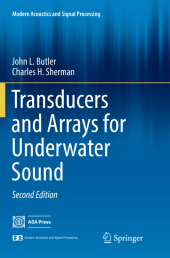 Neuerscheinungen 2018Stand: 2020-02-01 |
Schnellsuche
ISBN/Stichwort/Autor
|
Herderstraße 10
10625 Berlin
Tel.: 030 315 714 16
Fax 030 315 714 14
info@buchspektrum.de |

John L. Butler, Charles H. Sherman
(Beteiligte)
Transducers and Arrays for Underwater Sound
2. Aufl. 2018. xxv, 716 S. 398 SW-Abb., 4 Farbabb., 25 Tabellen, 5 Farbtabellen. 235 mm
Verlag/Jahr: SPRINGER, BERLIN; SPRINGER INTERNATIONAL PUBLISHING 2018
ISBN: 3-319-81802-3 (3319818023)
Neue ISBN: 978-3-319-81802-3 (9783319818023)
Preis und Lieferzeit: Bitte klicken
This improved and updated second edition covers the theory, development, and design of electro-acoustic transducers for underwater applications. This highly regarded text discusses the basics of piezoelectric and magnetostrictive transducers that are currently being used as well as promising new designs. It presents the basic acoustics as well as the specific acoustics data needed in transducer design and evaluation. A broad range of designs of projectors and hydrophones are described in detail along with methods of modeling, evaluation, and measurement. Analysis of projector and hydrophone transducer arrays, including the effects of mutual radiation impedance and numerical models for elements and arrays, are also covered. The book includes new advances in transducer design and transducer materials and has been completely reorganized to be suitable for use as a textbook, as well as a reference or handbook. The new edition contains corrections to the first edition, end-of-chapter exercises, and solutions to selected exercises. Each chapter includes a short introduction, end-of-chapter summary, and an extensive reference list offering the reader more detailed information and historical context. A glossary of key terms is also included at the end.
Dr. John L. Butler is Chief Scientist at Image Acoustics, Inc. and has had over forty years of both practical and theoretical experience in the design and analysis of underwater sound transducers and arrays. He has worked for and consulted to a number of underwater acoustics firms as well as Parke Mathematical Laboratories and the U. S. Navy. He has also taught courses in acoustics at Northeastern University, Naval Air Development Center, Raytheon Company, Harris Transducer Products and Hazeltine Corporation (now Ultra Ocean Systems, Inc.), Massa Products Corporation, Etrema Products, Plessey Australia, and Lund Institute of Technology, Sweden. He holds twenty seven patents and has presented or published well over thirty papers on electro-acoustic transducers. In 1977 he was elected fellow of the Acoustical Society of America and has received their 2015 Silver Medal Award for advancing the field of acoustic transducers and transducer arrays. His education includes Ph. D., Northeastern University, Boston, MA, and Sc. M., Brown University, Providence, RI.
Dr. Charles H. Sherman (1928-2009) received a B. S. degree in physics from the Massachusetts Institute of Technology in 1950. After his first job at TracerLab, Inc. in Boston, he became a research physicist at the Naval Underwater Sound Laboratory in New London, CT. He received M.S. and Ph.D. Degrees from the University of Connecticut and was elected Fellow of the Acoustical Society of America in 1974. He became a prominent expert in underwater transducers and arrays, presenting and publishing over thirty papers related to underwater acoustics. He also worked at Parke Mathematical Laboratories in Carlisle, MA, and taught advanced acoustics at the University of Connecticut and in the Ocean Engineering Department of the University of Rhode Island. He received the prestigious Decibel Award, which is presented to a scientist or engineer for outstanding contributions to sonar and underwater acoustics. After his retirement from the Sound Lab in 1988, he worked for Image Acoustics, Inc. and in 2007, co-authored the first edition of Transducers and Arrays for Underwater Sound, a technical monograph commissioned by the Office of Naval Research and the most comprehensive treatment to date of underwater transducers and arrays.


